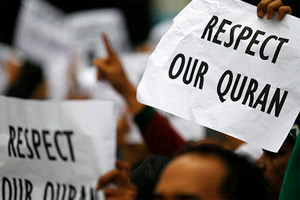![]()

Washington, August 28: The US will hand over administrative punishment to its six soldiers for their role in desecration of Holy Quran in Afghanistan early this year, an incident that had caused wide-spread protests and riots in the country and forced President Barack Obama to apologise.
The report of the investigation, conducted by a senior army official and released by the US Central Command yesterday, found some 100 Qurans and religious texts were burnt by US soldiers who found the holy literature being used by detainees for violent extremism.
The report by Army Brigadier General Bryan G Watson found that US servicemen mishandled the Muslim holy book and other religious materials, to include their disposal at an incinerator.
Noting that the "tragic incident" took place due to poor communication between "leaders and commands" and "lack of involvement of any senior leader", the probe, however, "rejected" any suggestion that those involved acted with malicious intent to disrespect the Quran of defame the faith of Islam, the report said.
It also blamed junior and mid-grade leaders of "choosing the easy way" instead of the "right way" to address a problem and found distrust among service members and their ignorance with respect to the importance and handling of Quran as well as other religious material as other key reasons behind the incident.
The report also noted that the US service members did not listen to the advice of soldiers from the Afghan National Army.
"Despite all the missteps, at no time was the path chosen by the involved US Service Members motivated by hatred or intolerance of a particular faith," it said.
According to the report, in the months prior to the search of the books in the prison library, multiple intelligence reports indicated that the library books were used as a medium of communication within the detainee population.
Watson wrote that the US Service Members had begun throwing books into an incinerator without soliciting any local national help because they were more worried about the intelligence value of these books.
Soon thereafter a local Afghan noticed that some of the books being dumped in the incinerator were religious texts, who then called other Afghans working in the area, following which the incinerator was immediately shut down.
The interpreter who advised the US army that the 60-75 per cent of the library's contents were radical or extremists was also culpable for the incident, the report held.
"I find that he did not fully perform his duties to warn the US Service Members about the appropriate handling of the books and to ensure that the final disposition of the book was appropriate," Watson wrote in his report, a portion of which was released by the Central Command yesterday.




Comments
Add new comment